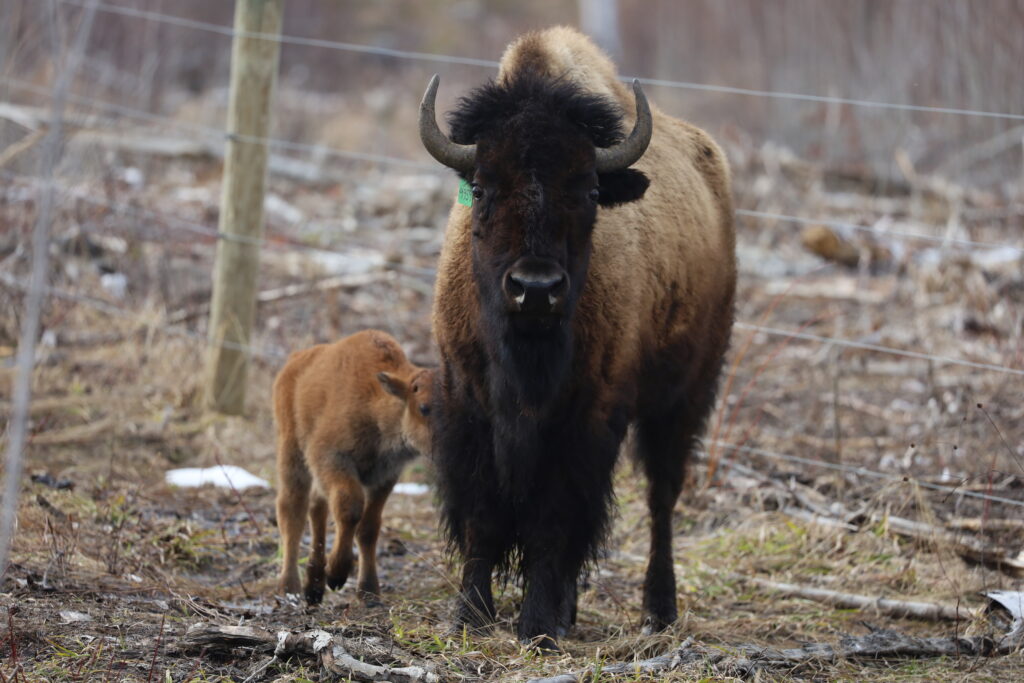For millennia, bison, or “Mashkode-bizhiki” in Ojibwe, were an integral part of the life of our native peoples. Bison provided food, clothing, and shelter. They shaped cultural practices and held deep spiritual significance.
Grand Portage, on the shore of Lake Superior at the U.S.-Canada border, is home to the Grand Portage Band of Lake Superior Chippewa, one of the earliest Ojibwe settlements in Minnesota. It has been a significant meeting place for people from various cultures for centuries.
On April 11, 2023, the band took delivery of seven bison to begin a herd on its 80-acre Bizhiki Ranch. Bison are hearty creatures native to plains lands. They need lots of grassland to thrive, something that is hard to find in the boreal forests of northeastern Minnesota.
Jared Swader, tribal planner and bison herd manager at Grand Portage, said that about 70 percent of the ranch was wooded before the bison arrived, with the rest swampy and grassy. The entire property was fenced with solar-powered electric fencing, and now almost 30 acres have been planted with grasses. Logging continues on the property as they look to create more pasture land.
About 10 days after the herd arrived, an unexpected surprise showed up. “I was out walking the pasture that morning and saw a brand-new bull calf,” Swader said. “We didn’t even know that one of the cows we got was pregnant.”
Since then, Swader acquired four more bison from the Prairie Island community in November last year. The herd now includes 10 cows and two bulls, one of which was the calf born last April.
For decades, the band has been studying, considering, and implementing creative strategies to cope with a changing environment. In 2012, a report on their efforts identified Grand Portage as a food desert, needing various methods to provide secure food sources. At the time of the report, it was recognized that moose populations, a vital source of protein for the community, were on the decline. Bison was identified as a viable option to replace the food sources lost to declining moose populations.
Swader said, “This program is all about food security for our community.” He expects that the first harvest and distribution of bison meat will start this fall.
Bison meat is low in fat and high in protein, similar to moose meat. It is considered a healthy alternative to beef. The bison are well adapted to the climate conditions on the North Shore and require minimal shelter over the winter.
In 2022 the band joined the Intertribal Buffalo Council (ITBC), a collection of 82 federally recognized tribes working to restore bison to Indian Country. ITBC efforts seek to preserve historical, cultural, traditional, and spiritual relationships for future Native American generations while achieving higher food sovereignty.
When the band hired Swader in 2015 as its programs administrator, he needed to gain experience with animal husbandry. He also oversees the band’s food sovereignty program, which is committed to self-sufficiency and preservation.
Working with Seth Moore, a Grand Portage biologist, and bison experts from the ITBC, Swader quickly learned how to manage a bison herd.
“They’re such cool animals,” Swader said. “I was surprised by how relatable bison are, almost like dogs.” He went on to describe the docile creatures as friendly beasts who come when he calls for them.
Swader described the community’s reaction to the bison, saying that people were excited to see them arrive and are “wondering what’s coming next.”
In addition to ITBC and Moore’s active support, Swader has hired Bison Technician Andrew Anderson to help manage the herd.
Bison don’t require intensive daily care, another benefit of raising them.
The bison farming effort is all about creating a healthy, affordable, and local food option for the 500 people who call Grand Portage home.
Bizhiki Ranch is located on Old Highway 61 in Grand Portage. The site includes a couple of storage containers with a tractor and skid steer, but little else. Visitors are asked to respect the fence line and make no effort to reach out and touch the bison. Bison are generally docile creatures, but showing them proper respect is best for them and you.

